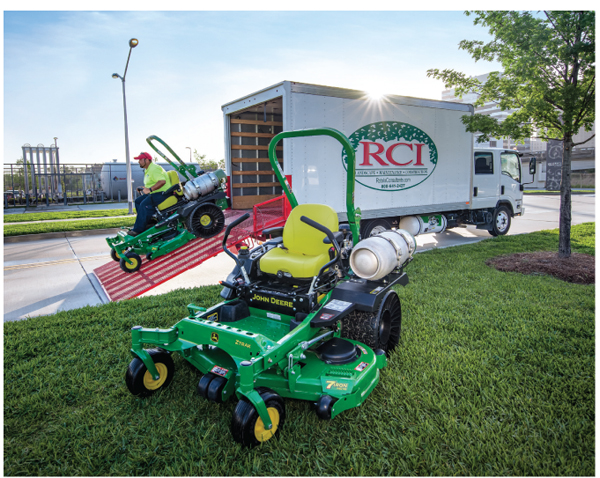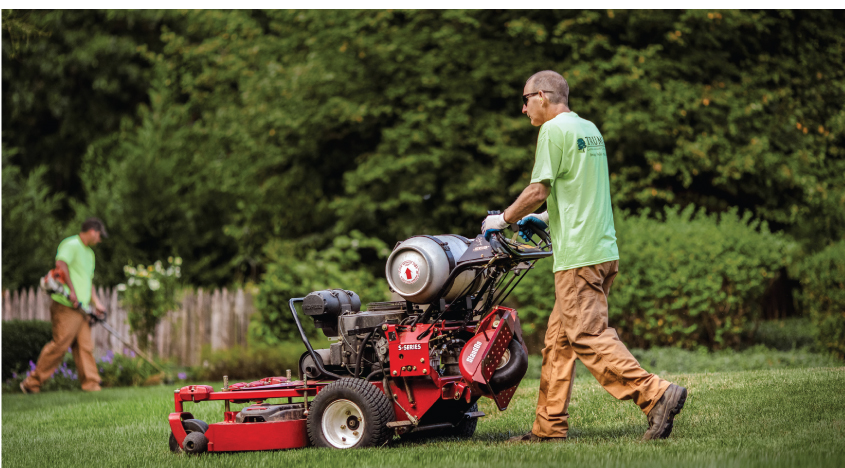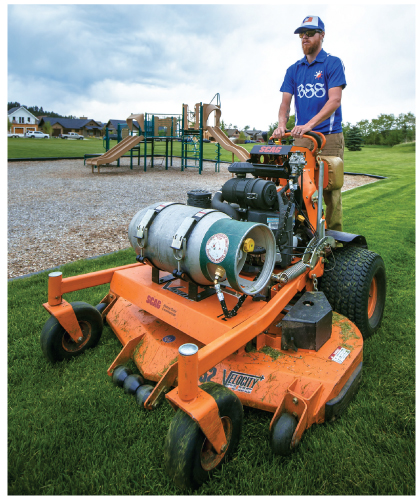Tuesday, January 16, 2018
While December and January are usually busy months in the propane industry, Jeremy Wishart, director of off-road business development at the Propane Education & Research Council (PERC), points out it is also the best time of the year to be talking to lawn and landscape professionals about switching to propane mowers. Decisions will be made between now and April or May, he said. “By the time the mowing season starts again, it is likely too late.

”Wishart has witnessed the evolution of propane lawn mowers from holding virtually no market share six years ago to now capturing 5% for models with 36- to 72-in. decks. While market growth has been steady and incremental, he said he believes it may be heading for a major growth spurt. “The propane school bus market is growing rapidly now, but it had very steady incremental growth beginning about 10 to 12 years ago. The propane mower market growth only started upward about six years ago,” he said. “The growth in propane school buses is now exponentially higher and I think the same thing will happen with propane lawn mowers as larger players see the benefits.
”In 2011 there were only three original equipment manufacturers (OEMs) when PERC launched a dealer demonstration program and encouraged manufacturers and dealers to push propane mowers. Until then, OEMs typically buried propane mowers at the back of their catalogs and produced propane models only by special request. PERC sought to convince OEMs to aggressively promote the benefits of propane-fueled alternatives, and not just grudgingly offer them as a specialty. The council funded production of 300 mowers to jump start the market. The jump start continued with the Propane Mower Incentive Program that offered an incentive of $1000 toward the purchase of a new propane mower, $500 toward a conversion kit, as well as additional incentives offered in some states. Several lawn and landscape companies became early adopters of propane, which promised a positive beginning.
“I thought there was a mistake in calculating numbers at the end of the year,” said Doug Duschene, owner and CEO of Bozeman Site Services (Bozeman, Mont.) after his company’s first year operating propane lawn mowers. “The savings were so significant.” Duschene started researching propane mowers several years ago and was immediately interested in how much pollution could be reduced. Initially several employees were intimidated by the challenge of switching to a new system since traditional fuel had been working well. Now, the company culture has changed for the better, not only due to cost savings but also due to time savings.
Employees are now able to serve their customers over four days a week instead of five and have three-day weekends. They advise other companies to not be intimidated in making the switch to propane mowers, to realize they will not compromise equipment reliability, and to understand it will be a cost-saving endeavor after the initial investment.
“Today there are 14 OEMs of propane mowers and a lot more businesses spreading the word,” Wishart said. “Change is always tough, but as companies hear others talk about the cost savings, time savings, and less damage to the environment, they become more interested.” He noted that as more and more companies in large metropolitan areas and cities like Chicago have made the switch, other companies in surrounding areas learn about it. Landscape companies like to hear about ways to save money, and articles describing benefits such as fewer maintenance issues like dirty air filters, fouled spark plugs, and water fouling the fuel get their attention. “The next thing you know, companies near Chicago and up in Milwaukee are investigating propane mowers,” Wishart said.
Sebert Landscaping in Chicago is one company that is all-in with propane lawn mowers. “Now it has become a way of life,” says Ralph Meyer, the fleet manager who is also in charge of all equipment purchases. “I’d like to see the whole landscaping industry move to using propane.” Meyer initially bought three propane mowers to compare with his company’s diesel-powered units. He found that carbon emissions were 25% lower. “We wanted to be more environmentally friendly but certainly like the cost savings, no spilling in fuel transfer, no venting, and lower maintenance. At this point, 70% of our fleet of 300 mowers runs on propane.”
Mike Trump of Trump Lawn and Landscape in York, Pa. is also pleased with its move to propane mowers. “It seems like more people would jump on board,” he said. Trump was initially attracted to the green aspects of propane mowers, but also certainly appreciates the savings for the fuel. While there were initial concerns, employees now like the fuel containers that are easy to put on and take off. “They like not always having to run to get gas and having no mess.”
“There were roadblocks in the early days that are no longer presenting as much of a challenge,” Wishart outlined. “With more manufacturers, the benefits are being promoted and sales are growing. In addition, the manufacturers have taken it upon themselves to be proactive in training equipment dealers and technicians to be able to service propane mowers.”
Landscapers and other grounds maintenance professionals are also initially concerned about propane prices versus diesel prices, he said. “Diesel prices are posted at every gas station, but propane prices are more of a mystery, and initially many think in terms of grill cylinder costs. Once they get the real quotes and understand they can usually lock in a contract price, they become more interested.”
In Louisiana, Rotolo Consultants now has 90% of its mowers running on propane. Sustainability, performance, and profitability are three things they consider to be positives, according to Brandt Martin, vice-president of operations. Martin likes the fact that propane is provided in portable containers that his staff can just attach to the machine. “It works better to have a self-contained canister that lasts all day. The endurance on a 43-lb cylinder has proven to give us 8.5 hours of mowing operations,” he said. The company has been so pleased with the benefits of propane that it has now also switched to a fleet of 70 service trucks running on propane. —Pat Thornton
(SOURCE: BPN magazine, January 2018)

”Wishart has witnessed the evolution of propane lawn mowers from holding virtually no market share six years ago to now capturing 5% for models with 36- to 72-in. decks. While market growth has been steady and incremental, he said he believes it may be heading for a major growth spurt. “The propane school bus market is growing rapidly now, but it had very steady incremental growth beginning about 10 to 12 years ago. The propane mower market growth only started upward about six years ago,” he said. “The growth in propane school buses is now exponentially higher and I think the same thing will happen with propane lawn mowers as larger players see the benefits.
”In 2011 there were only three original equipment manufacturers (OEMs) when PERC launched a dealer demonstration program and encouraged manufacturers and dealers to push propane mowers. Until then, OEMs typically buried propane mowers at the back of their catalogs and produced propane models only by special request. PERC sought to convince OEMs to aggressively promote the benefits of propane-fueled alternatives, and not just grudgingly offer them as a specialty. The council funded production of 300 mowers to jump start the market. The jump start continued with the Propane Mower Incentive Program that offered an incentive of $1000 toward the purchase of a new propane mower, $500 toward a conversion kit, as well as additional incentives offered in some states. Several lawn and landscape companies became early adopters of propane, which promised a positive beginning.
“I thought there was a mistake in calculating numbers at the end of the year,” said Doug Duschene, owner and CEO of Bozeman Site Services (Bozeman, Mont.) after his company’s first year operating propane lawn mowers. “The savings were so significant.” Duschene started researching propane mowers several years ago and was immediately interested in how much pollution could be reduced. Initially several employees were intimidated by the challenge of switching to a new system since traditional fuel had been working well. Now, the company culture has changed for the better, not only due to cost savings but also due to time savings.

Employees are now able to serve their customers over four days a week instead of five and have three-day weekends. They advise other companies to not be intimidated in making the switch to propane mowers, to realize they will not compromise equipment reliability, and to understand it will be a cost-saving endeavor after the initial investment.
“Today there are 14 OEMs of propane mowers and a lot more businesses spreading the word,” Wishart said. “Change is always tough, but as companies hear others talk about the cost savings, time savings, and less damage to the environment, they become more interested.” He noted that as more and more companies in large metropolitan areas and cities like Chicago have made the switch, other companies in surrounding areas learn about it. Landscape companies like to hear about ways to save money, and articles describing benefits such as fewer maintenance issues like dirty air filters, fouled spark plugs, and water fouling the fuel get their attention. “The next thing you know, companies near Chicago and up in Milwaukee are investigating propane mowers,” Wishart said.
Sebert Landscaping in Chicago is one company that is all-in with propane lawn mowers. “Now it has become a way of life,” says Ralph Meyer, the fleet manager who is also in charge of all equipment purchases. “I’d like to see the whole landscaping industry move to using propane.” Meyer initially bought three propane mowers to compare with his company’s diesel-powered units. He found that carbon emissions were 25% lower. “We wanted to be more environmentally friendly but certainly like the cost savings, no spilling in fuel transfer, no venting, and lower maintenance. At this point, 70% of our fleet of 300 mowers runs on propane.”
Mike Trump of Trump Lawn and Landscape in York, Pa. is also pleased with its move to propane mowers. “It seems like more people would jump on board,” he said. Trump was initially attracted to the green aspects of propane mowers, but also certainly appreciates the savings for the fuel. While there were initial concerns, employees now like the fuel containers that are easy to put on and take off. “They like not always having to run to get gas and having no mess.”

“There were roadblocks in the early days that are no longer presenting as much of a challenge,” Wishart outlined. “With more manufacturers, the benefits are being promoted and sales are growing. In addition, the manufacturers have taken it upon themselves to be proactive in training equipment dealers and technicians to be able to service propane mowers.”
Landscapers and other grounds maintenance professionals are also initially concerned about propane prices versus diesel prices, he said. “Diesel prices are posted at every gas station, but propane prices are more of a mystery, and initially many think in terms of grill cylinder costs. Once they get the real quotes and understand they can usually lock in a contract price, they become more interested.”
In Louisiana, Rotolo Consultants now has 90% of its mowers running on propane. Sustainability, performance, and profitability are three things they consider to be positives, according to Brandt Martin, vice-president of operations. Martin likes the fact that propane is provided in portable containers that his staff can just attach to the machine. “It works better to have a self-contained canister that lasts all day. The endurance on a 43-lb cylinder has proven to give us 8.5 hours of mowing operations,” he said. The company has been so pleased with the benefits of propane that it has now also switched to a fleet of 70 service trucks running on propane. —Pat Thornton
(SOURCE: BPN magazine, January 2018)

